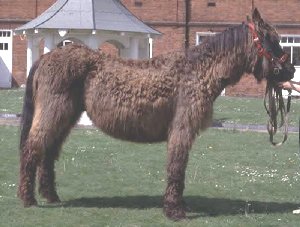 Our horses are an integral part of our families. We raise them up, keep
them safe, but sometimes the worst can happen and for one reason or another, they become ill. Many horses
will fall prey to a disease known as Cushing’s, and while it can be fatal, there are ways for your horse
to still live a relatively happy life, even with the disease. Here’s what you should know about Cushing’s
and how to handle it.
Our horses are an integral part of our families. We raise them up, keep
them safe, but sometimes the worst can happen and for one reason or another, they become ill. Many horses
will fall prey to a disease known as Cushing’s, and while it can be fatal, there are ways for your horse
to still live a relatively happy life, even with the disease. Here’s what you should know about Cushing’s
and how to handle it.
Cushing’s, at this point in time, isn’t entirely understood just yet. The
biggest worry with the disease is that there’s no known cure, and while it has some more minor side effects,
such as excessive eating, urination, and thirst, as well as hyperglycemia, it also compromises your horse’s
immune system, leaving it open to much deadlier things in the future.
Regardless, it’s possible to keep things in check and improve your horse’s
likelihood of surviving longer and longer, but it’ll take some real dedication on your part as the owner. The
biggest shift is to realize that because of the compromised immune system, anything that could cause trouble in
a normal horse will go double for a Cushing’s horse.
As a result, even simple changes to diet or routine should be watched
carefully as your horse could react negatively. Everything that would normally seem like something to shrug off
is to be taken intensely serious. Scheduling visits to the vet, even when your horse appears perfectly fine,
will become the new norm. This includes deworming as an immune deficient horse will become host to far more
parasites than a healthy one. It’s best to just assume that this will be occurring and to have the deworming
procedure done at regular intervals throughout the year.
Grooming also becomes more important with a Cushing’s horse. Much of the time,
they will have trouble properly regulating their body temperature, so you’ll want to keep them as clean as
possible with regular grooming sessions and even body clipping during the hotter seasons. Also, washing and
drying properly require more attention as putting a blanket over a damp Cushing’s horse will result in one sick
horse come morning.
Along with those regular deworming times, make sure to have their hooves and
legs checked regularly as they’re more likely to have problems due to the weaker immune systems. If you see
them in a tender-footed stance, this is a pretty clear indication that they should be looked at. As with the
vet checkups, you should just assume at all times that they’re dealing with leg and hoof problems, so keep a
schedule of theses and don’t break it.
Seeing as how a lot of Cushing’s horses will need help regulating their
insulin and glucose levels, you’ll have to do that for them and keep their diet extremely balanced. Add in some
Vitamin E, mehionine, biotin, and lysine to encourage hoof growth and muscle mass, as well as immune system
support, and your horse could indeed continue living a long life.
Cushing’s is not a death sentences for your horse. It doesn’t have to be
anyway, as long as you’re willing and ready to accept the added responsibility. Take charge and keep your horse
healthy!
Related Articles
Breaking a Leg- What It Means For Your Horse
Deadly Equine Diseases
Tips for Keeping Flies Under
Control
Horse Inspection Checklist
Five Most Common Horse Diseases
How to Spot a Malnourished Horse
Top 10 Most Poisonous Plants for Horses
Feeding and Rebuilding a Malnourished Horse
Helping a Horse Living with Cushing's
How to Treat Abscesses on Your Horse
Colic and Your Horse
Confirming That Your Horse Has Rabies
Helping a Pregnant Mare
Handling a Rattlesnake Bite to Your Horse
Being Aware of Tetanus and Your Horse
Preventing Thrush in Your Horse